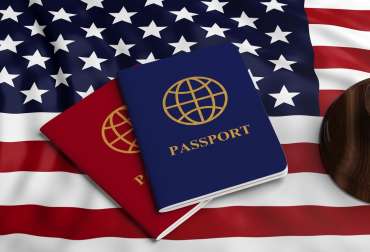Yes, Americans can have dual nationality with multiple countries. There are no restrictions on how many citizenships you can hold.
Dual nationality means that a person is a national of two countries at the same time.
The US government in 1990 took a friendlier approach in line with other Latin american and European countries in 1990. The adopted new regulations presumed that an individual does not intend to give up citizenship when performing expatriating acts.
Currently, U.S. government does not endorse dual citizenship as a matter of policy, it recognizes the existence of dual citizenship and generally tolerates the maintenance of multiple citizenship by U.S. citizens.
According to State department, U.S. law does not mention dual nationality or require a person to choose one nationality or another. A U.S. citizen may naturalize in a foreign state without any risk to his or her U.S. citizenship. However, persons who acquire a foreign nationality after age 18 by applying for it may relinquish their U.S. nationality if they wish to do so.
Dual nationals owe allegiance to both the United States and the foreign country. They are required to obey the laws of both countries, and either country has the right to enforce its laws.
Advantages
Americans who don’t want to be trapped in one country with draconian laws, escaping military service and unfair politics, dual citizenship is the way to go, to explore more opportunities offshore. There is also a new trend recently high profile americans are investing in a passport that come with second citizenship benefits.
- Enjoy Freedom of movement hold multiple passports for travel
- Pursue new life, living and working abroad
- Access to Healthcare and education abroad for family and children
- Business opportunities and make investments
- Own a second home abroad (investing in real estate)
- Wealth management
- Privacy and confidentiality
- Preserve family and cultural ties from ancestors
Disadvantages
There are also some disadvantages and conflicts, associated with dual citizenship. As a dual national, you are obligated to obey the laws of one or more countries (eg. Military service, Double Taxation)
Dual nationality may hamper efforts of the U.S. Government to provide consular protection to them when they are abroad, especially when they are in the country of their second nationality.
Dual nationals are also restricted in some countries to work in government offices and engage in political affairs.
US Passport
It is very important for dual nationals must know how to use the passports properly when you travel. You may be subjected to detention or ban, for not using the right passport to enter and leave the country as a citizen. Using foreign passport to travel to or from a country other than the United States is not inconsistent with U.S. law.
According to State department advice.
- U.S. nationals, including dual nationals, must use a U.S. passport to enter and leave the United States.
- Dual nationals may also be required by the foreign country to use its passport to enter and leave that country.
How to Renounce US nationality?
Congress passed the Expatriation Act of 1868, which granted Americans the right to freely renounce their U.S. citizenship.
Americans who acquire a foreign nationality after age 18 by applying for it may relinquish their U.S. nationality if they wish to do so. In order to relinquish U.S. nationality by virtue of naturalization as a citizen of a foreign state, the law requires that the person must apply for the foreign nationality voluntarily and with the intention to relinquish U.S. nationality. Intent may be shown by the person’s statements and conduct. There is also a fee of $2,350.
Be careful! If you renounce US citizenship without a second nationality, you risk becoming a stateless person.
A person wishing to renounce his or her U.S. citizenship must voluntarily and with intent to relinquish U.S. citizenship:
- Appear in person before a U.S. consular or diplomatic officer,
- Foreign country at a U.S. Embassy or Consulate; and
- Sign an oath of renunciation
Americans who intend to give up citizenship voluntarily must be aware of the renunciation of U.S. citizenship may have no effect on their
- U.S. tax obligations
- Military service obligations
- Avoid possible prosecution for crimes which they may have committed or may commit in the future which violate United States law, or
- Escape the repayment of financial obligations, including child support payments





